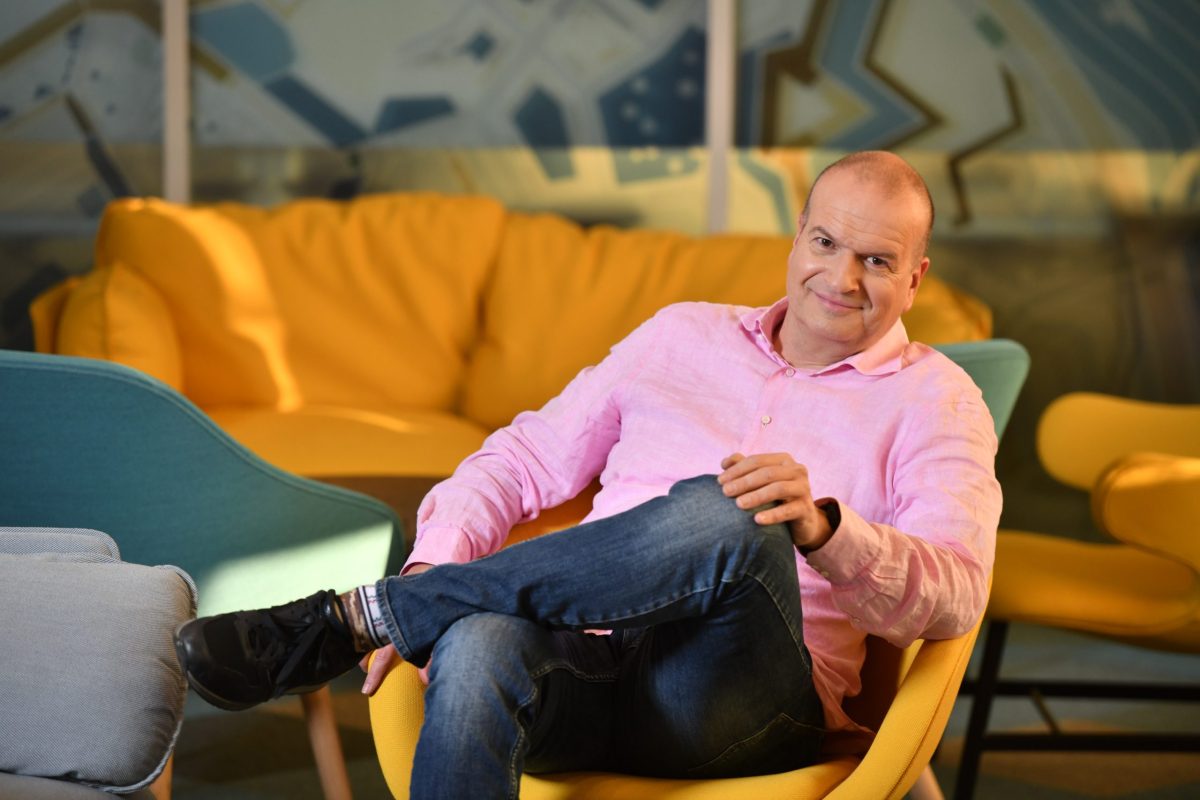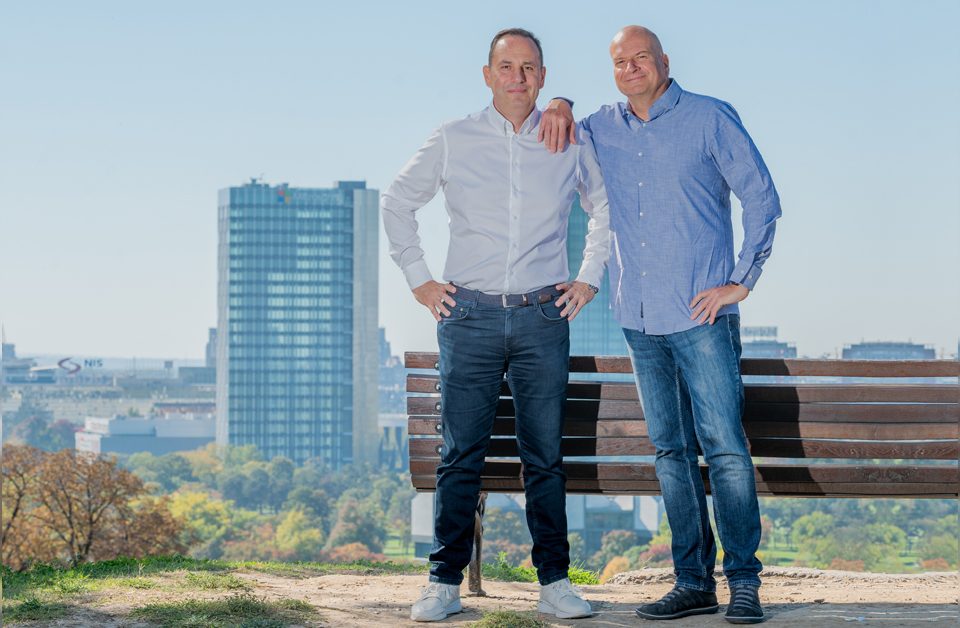In the previous two decades, Microsoft Serbia and its Development Center (Microsoft Development Center Serbia – MDCS) have grown into a team of hundreds of engineers, program managers, data scientists, and marketing and sales representatives. The software engineering team is devotedly working on creating technologies used by millions of people worldwide. We spoke about the campus’s growth and plans with the Director of Microsoft Serbia, Milan Gospic, and the Chief Technology Officer in MDCS, Dejan Cvetkovic.
Microsoft will soon celebrate its 20th anniversary of doing business in Serbia. What are the main achievements you would highlight from this journey?
Milan: Microsoft’s position, having both Commercial and Development teams in the country, impacts the country’s digital economy and human capital development and builds an immense potential for Serbia. For 20 years in Serbia, Microsoft has been devoted to the digitalization of society and industry, providing cutting-edge technology, bringing experience and practices from global markets, and growing local talents and digital skills. We keep investing in a network of local partners, stimulating the growth of the local economy. Today, many Serbian citizens are skilled and use our technology at home and at work. Microsoft is present in all aspects of business, from consumer and small & medium businesses to large enterprises in the private and public sectors. This results in the overall progress of society, enabling many new digital services, modernization of industry, and boosting innovations. It makes us proud to see that Microsoft’s mission to empower every person and organization has contributed to the country’s growth into a talent-driven regional innovation center. What we pioneered and devoted 20 years of our work on this market is coming true – the ICT becoming a strong economic pillar of the country, reaching 10% of the country’s GDP, many new eGov services, digitalizing industry, and significant progress in human capital, startup ecosystem, and innovation.
Dejan: Microsoft Development Center in Serbia was founded in 2005. We are almost 18! For all those years, we have contributed to creating the most modern technology in Belgrade. The situation was different when we started. We had to prove ourselves and demonstrate our contribution, and we had to make crucial decisions quickly. Knowledge, talent, motivation, vision, and a multidisciplinary team that can develop pragmatic solutions, execute projects rapidly, and works closely with clients, have brought us to where we are today. Regardless of the team size, we managed to maintain the entrepreneurial spirit, both then and now. Today, more than 700 employees and eight engineering teams are working with us to develop and improve some of the most critical Microsoft products.
In your opinion, how fast is Serbia accelerating in digital transformation?
Milan: Digitalization is the focus of the Government and the industry sector. The benefits of digitalization are now evident. Businesses are embracing digital trends to create a more resilient economy, and the Government is using digitalization to enhance citizen services and to address productivity. On one side, we see businesses, mostly in the private enterprise segment, accelerating with digital technology; on the other, we see a gap in following global digital trends in the public sector and small businesses. The gap is there for two main reasons: regulation, as Serbia has a restrictive policy for cloud usage and digital skills, especially with business leaders and the wide public. Microsoft has a solid long-term relationship with the Serbian Government, supporting the country’s transition to embrace the latest digital trends, such as cloud services and the use of data and AI. Microsoft has the role of a trusted advisor and digital skilling partner. We provided digital skills to over 60,000 Serbian citizens, many schoolteachers, closely cooperating with academic institutions, supporting programming in primary and secondary schools and University masters, enabling internships in our development center, supporting NGOs, and startup and innovation community, promoting Microsoft culture and ethics. Our latest research shows that Serbia has excellent talent results and gender equality in the IT industry. We wish to see more agility in using the Cloud to improve productivity, cybersecurity, and sustainability. The Government, enterprises, and academia have to get together to build a more resilient society using digital trends.

How does Microsoft Development Center Serbia manage people in the hybrid environment, and how do you think the business culture will look in the future?
Dejan: The hybrid way of work implies a certain level of separation from the team, so empathy and the ability to understand the needs of others become essential for leaders in creating thriving teams. Hybrid work is more challenging because it is harder to balance productivity and personal gain. The corporate hybrid model provides flexibility and individual work style, simultaneously ensuring we live our culture. We are entirely open to all people from the East and the West, and we have team members from dozens of different countries. So, we don’t ask where people come from or where they work. They should demonstrate curiosity, a desire for knowledge, learning, teamwork, and a desire to develop software that changes the world. We welcome young software engineers with no experience straight out of college, but we also look to hire seniors and people with experience.
How can technology help in building a resilient society?
Milan: We believe that new technologies can play a crucial role in building our capacity for resilience by amplifying the ability of organizations to reach and support the individuals and communities in our society. Building a resilient organization shows how Tech-intense you are: how you adopt and integrate the latest technology, how you build your own unique digital capability and trust technology. For any organization to succeed, it needs to empower its employees, foster a new culture of hybrid work, engage its customers in new ways, transform products and services with new business models and optimize operations. Our technology is helping to build resilience at every level of society: individual resilience, protecting the rights of marginalized, exploited, and vulnerable communities; institutional resilience, supporting the operation and cooperation of business, Government, and civil society; infrastructure resilience, sustaining the sociotechnical networks delivering essential goods, services, and utilities; and, lastly, information resilience, reducing barriers to data sharing, collaboration, and evidence development.
Dejan: Microsoft’s approach combines every aspect of modern cybersecurity – technology, threat intelligence, and human expertise. All our products and services are built from the ground up with security-by-design, which helps deliver defense in depth. We provide customers with the most comprehensive and integrated solutions available. Every company needs to instill a culture of security. Investment in security should be balanced across the lifecycle of an incident – before, during, and after. Strong prevention and rapid response can limit the potential damage an attacker can inflict before detection and reduces recovery time. This risk-based approach makes business resiliency “the North Star” of your security strategy, acknowledging that you can never have enough security people, time, and resources to mitigate every possible threat.

What are the key trends to look for in tech in the year ahead?
Milan: It’s all about the use of the Cloud to “do more with less.” To be data-driven, deliver efficiency with automation and AI, innovate with the cloud platform, deploy hybrid work and protect everything, everyone, everywhere. This is what our customers demand from us: less time, less cost, less complexity, with more innovation, more agility, and resilience. It is proven that Serbia has strong potential and all the prerequisites to become the digital hotspot of this part of Europe and to base its economic development on innovations and new technologies, such as artificial intelligence. Artificial intelligence is a technology that defines our age and can do a lot for people, industries, and society, and the possibilities of its application are countless. Serbia is on the right path to using technology to accelerate economic and social development. With Microsoft Cloud technology, Serbia can and will speed up this development by boosting innovation in all sectors, from traditional industry to the latest biotech and startup activities. Microsoft in Serbia remains committed to the country’s development, with the vision of Serbia as a regional innovation and talent center, using digital technology to “do more with less” and tackle productivity, cybersecurity, and sustainability challenges while building resilient industry and society.
Dejan: For years, we have been at the forefront of developing the digital ecosystem here, investing heavily in developing education in Serbia. Everything that happens here affects the further growth and development of the entire IT industry. The best is yet to come! Microsoft Development Center in Serbia is already very well positioned, evidenced by the fact that we participate in developing some of the most critical and competitive Microsoft projects. Looking at the year ahead, we are in a position of strength with so many opportunities. We are investing in the future, and most importantly, we have world-class people to ensure continued success. Given that we have often shown that we are good at dealing with complex situations, I am convinced that the future of our diverse international team in Belgrade will be even more enjoyable.





